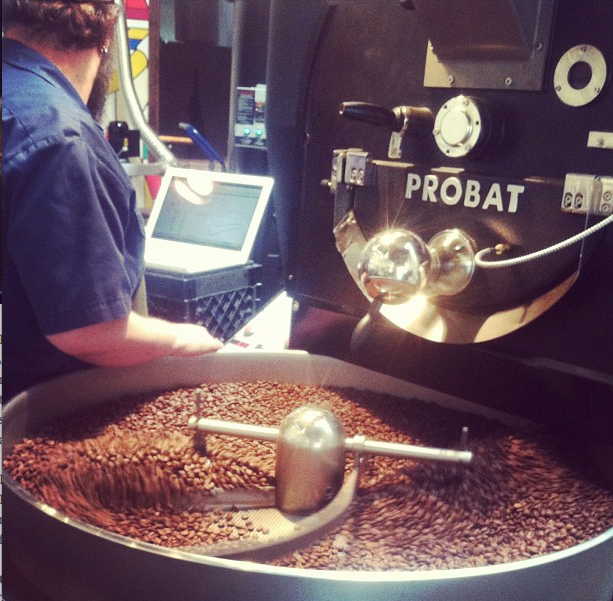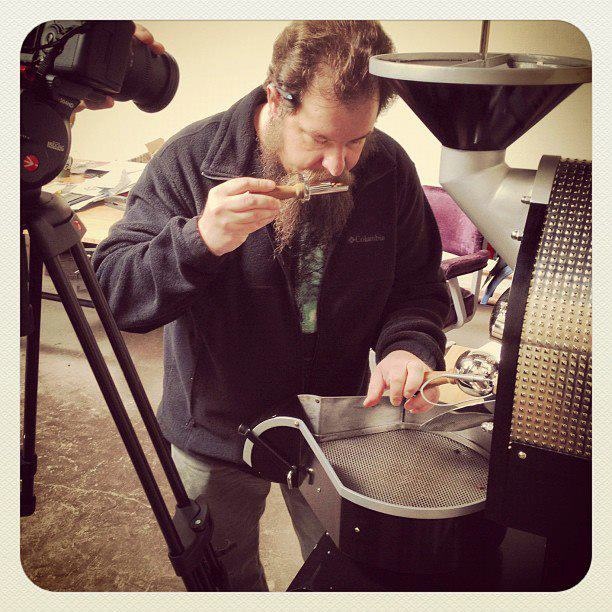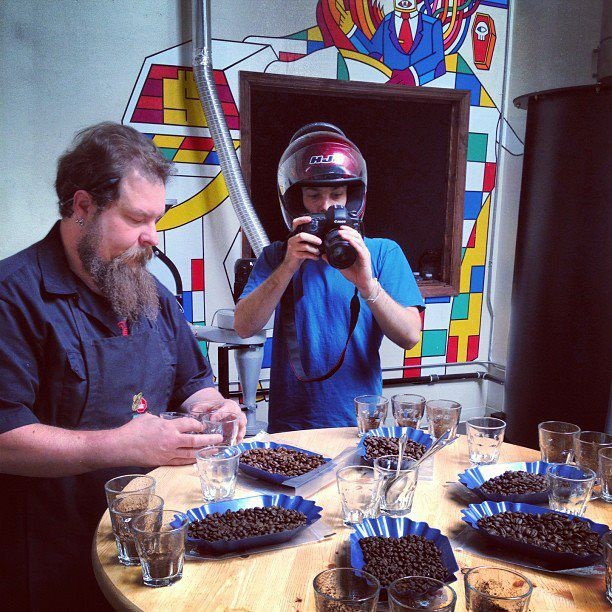Dennis Jackson is the master roaster at Bow Truss, bringing 13 years of roasting experience to Bow Truss Coffee Roasters. As a licensed Q Grader, a certification for professional cuppers that is similar to being a wine sommelier, Dennis travels to Europe multiple times a year working as a teacher and consultant for new coffee roasters. He also volunteers for the Specialty Coffee Association of America where he is a certified instructor and has judged Barista contests in Russia and the Czech Republic. We spoke to Dennis as he prepared for a trip to Brazil to attend the Late Harvest, Brazil’s Natural Process Cup Of Excellence competition. This is only the 2nd time they have held this competition with all natural coffees though it’s Dennis’ 7th competition with the Cup Of Excellence. Dennis was selected due to his knowledge of naturally processed coffee.
Despite his wealth of experience, Dennis is a firm believer that anyone can be taught how to train his or her pallet. In our interview he shares his tips on how to experience the true flavor of coffee. Our discussion with him also sheds some light on the existing direct trade relationships we have with farmers and the type or relationships we hope to grow in the future.
Do you have any tips for helping us experience the true flavors of coffee?
Just keep tasting—Practice makes perfect. A good way to refine your pallet is to eat different foods that you are not used to, especially fruits. There are so many different fruits in coffee like plums, apricots, and blackberries; there are even hints of mango and lime in some Central American coffees. You can also pick up a lot of different spices, like cardamom and cumin. We used to taste different things every week. We would go to Whole Foods and buy a bunch of different fruits or a bunch of different chocolates.
If you could have any coffee in the world what would it be?
I’m a big fan of natural coffees from Kenya and Ethiopia, especially an older Harrar, which is hard to come by now because of the laws in Ethiopia. The Harrar was a natural coffee that had a lot of blueberry and sweet flavor.
Can you take us through the process of sourcing coffee?
There are two ways: using brokers or direct trade. What generally happens with brokers is they have a bunch of options to sample. If there is a specific origin like El Salvador or Guatemala I’ll look at what they have to offer, call them and request samples. Then we will cup the samples.
Otherwise, I go to origin a lot so I know the specific areas and farmers that we can get samples directly from. For instance, we are working on an El Salvador right now that we just cupped yesterday. We have a direct trade with a group out there because I’ve been there personally. We will be rolling out a direct trade from Costa Rica and Guatemala has soon as I get back from an upcoming trip to Brazil.

What unique opportunities have you had working within the constraints of a startup?
We are roasting really small batches – usually 18 to 21 pounds. You taste a lot that goes through so it’s very good for quality control. It’s really nice to be able to roast that small of an amount because we can keep an eye on it. We know exactly what is going on. I’m not ordering a full container of coffee so we can really see what is going on each time a delivery gets here.
What successes have you had while working within these constraints?
Some of our success has been getting direct trade relationships without being very big. We have had some great people that reached out to us that have been really supportive. Generally, when you do a direct trade with coffee you really need to piggyback on someone else’s coffee: for example, if a friend of mine has coffee coming into the U.S. from El Salvador generally I would have to put 10 bags on his container. These farmers are helping us avoid that by sending us 10 bags of coffee directly. We also go through a company called Thrive that lets us work directly with farmers and takes care of a lot of the importing.
What are the new trends in the coffee world?
There is a new trend coming in coffee where smaller roasters like us are able to get direct trade. We are considered a micro-roastery and for a lot of mirco-roasterys it has been historically very tough to get it right from the source. I think we are making a lot of headway.
Can you share a few US-based roasters whose work you admire?
Local roaster Dark Matter and Wrecking Ball in Washington D.C. are doing phenomenal work. Their roasting style is a little different than normal and they are making phenomenal coffee that their customers are willing to spend the money for. It’s pretty exciting.

What are you most proud of so far from your time at Bow Truss?
We are doing a collaboration with Dark Matter. Working with someone like that in coffee is very new. A lot of coffee roasters don’t want to give up their roasting style or compromise it by working with someone else. For us, this collaboration with Dark Matter is really exciting.
We use a drum roaster, which is the traditional way to roast coffee and Jesse at Dark Matter uses an air roaster. The big difference with an air roaster is you get more acidity out of it and less sugar. With a drum roaster you get a little more body and sugar development. What we are doing is taking one coffee from El Salvador; he is roasting part of that coffee on the air roaster while I am roasting some on the drum roaster. Than we are combining it. We have been working together trying to get the ratios right. When I tasted the coffee that he roasted I was able to say ok, now I know what I want to do with the coffee. I realized I wanted to develop the sugars in the coffee so we did that and it turned out to be phenomenal. Now that the ratios are is nailed down we are working on the packaging so keep an eye out for it.
Where would you like to see the company go in the future?
I’ve been contacted by another company who is looking to do a collaboration so I am looking forward to that. I am also looking forward to growing so we can source more coffees. I think as we grow I could get the Indonesia and coffee from some places in Africa.
To see Dennis in action check out this video by Doejo’s motion graphics team.
